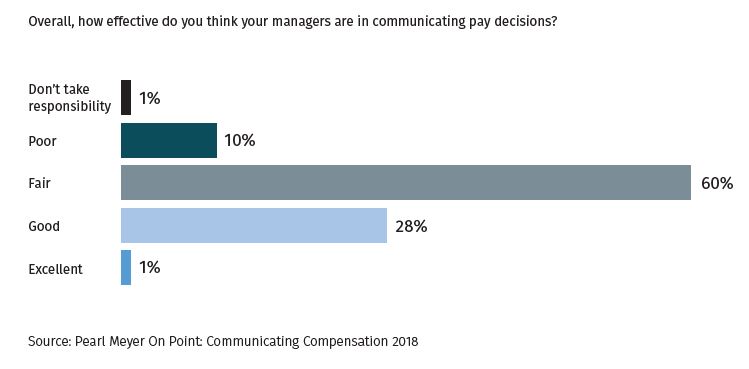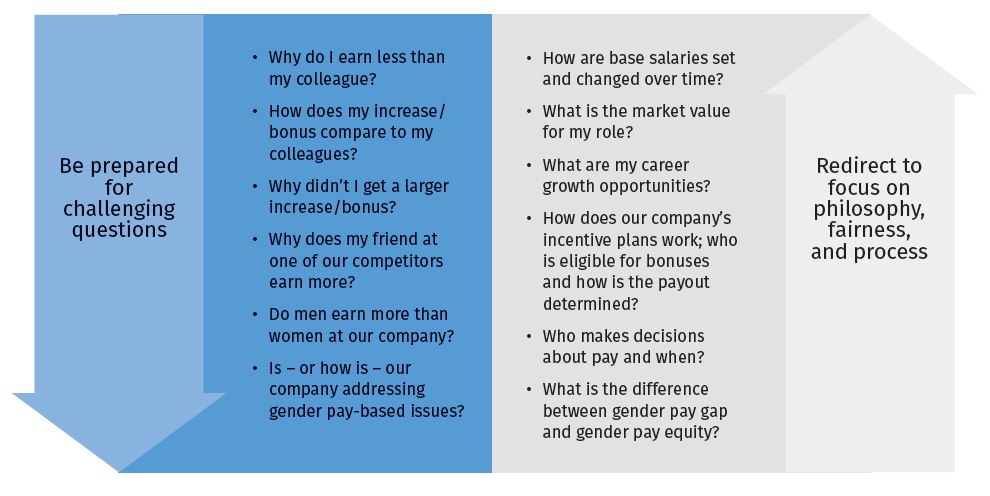
Article | May 2019
Updating the Compensation Conversation: Time to Reboot Manager Effectiveness
Money is a tough, complicated, and personal subject. Here are four steps to help managers refine their message and delivery.
Money. It’s a tough subject. It’s a sensitive subject. It’s an uncomfortable subject. It’s no wonder we find that compensation communications are an ongoing, chronic challenge among companies, no matter the size.
Specifically, it’s those manager-to-employee discussions about pay decisions where companies discover that managers just aren’t that good at it.
Yet managers continue to have primary responsibility for perhaps one of the most important face-to-face conversations of the year: the pay discussion. Even for the greatest managers in the world, these conversations can throw some curveballs, in addition to simply being awkward. Ultimately, one person needs to look another person in the eye and tell them how much the company thinks they’re worth. It takes skill, confidence, and lots of practice to do that gracefully and, maybe more important, effectively.
If companies are going to continue to rely on managers to deliver personal messages about pay to employees, especially in this ever-complex compensation landscape, it may be time to give their training, education, and support materials an upgrade. That does not mean starting over. It means taking the fundamental compensation communication tools and resources most companies have already created, such as talking points and frequently asked questions (FAQs), and refreshing and enriching the content to better resonate with today’s workforce.
Upgrade #1: Make Talking Points More Personal.
Sitting down with employees to talk with them about current and future income is not an easy thing to do—especially when you’re in the middle. In many companies, managers are messengers between the workforce and human resources, which can make pay conversations feel disconnected, or even disingenuous. It can be difficult for a manager to defend certain decisions when they haven’t been personally involved in the details, like setting compensation budgets or evaluating market competitiveness. If the only talking points available to help managers through these discussions are generally applicable to all employees, there is a risk that the employee will walk away from the conversation feeling like just another widget on the assembly line.
To help ensure the conversations are as personal as they should be, HR should take the time to collaborate with managers and help them create tailored talking points for their employees. Yes, this requires more time and thought, but it is the only way pay conversations will feel more personal. Through this process, HR can also help managers practice—yes, roleplay! Practice can help raise confidence in delivering the message, allow for more active listening and, in turn, improve the quality of the employee’s experience during the actual discussion. This can be an especially valuable experience for managers facing some of the more challenging discussions, such as news about no increases, limited bonuses or an increase for a high performer that will likely fall below expectations.
Upgrade #2: Do an FAQ Reality Check.
Compensation FAQs are common and generally effective support tools, giving managers the safety net they may need to answer expected employee questions with confidence. But as the compensation landscape grows more complex, it is time to make sure your company’s compensation FAQs are going beyond the basics. FAQs should include new compensation-related topics that pose potential message challenges, such as median employee pay (better safe than sorry) and gender pay equity. FAQs should also help managers direct the focus of their conversations to how fairness, philosophy, and process play a critical role in making decisions about an employee’s pay.
HR should also consider soliciting compensation questions from managers and/or employees to see if there are as-yet unidentified topics or concerns that should be addressed. Often, those in HR think they have done a thorough job of anticipating all the possible questions, but there may be undercurrents of misunderstanding that aren’t as obvious. There is the added benefit that by reaching out to ask for input, HR is further demonstrating the company’s commitment to helping employees understand its compensation philosophy and practices.
Upgrade #3: Increase Transparency in Your New Hire Materials.
Many companies do a good job of incorporating general information about their pay programs into onboarding programs. However, today’s heightened push around pay transparency provides a good opportunity for recruiters and HR to start having more detailed conversations with employees about how their pay is set at the time they are hired and setting expectations for how raises and bonuses will be determined and discussed during their employment. HR and recruiters also have the ability during this stage to explain to the employee what role managers play in the pay determination process. By putting the manager’s role in the proper context, the pressure may be taken off in advance, which can help facilitate better overall conversations.
Upgrade #4: Make Benchmarking 101 a Required Course.
One of the most challenging aspects of compensation for employees to understand is how to appropriately compare their own levels of pay with those of internal colleagues and/or people who have jobs in similar positions at other companies. And let’s face it, people are always going to try to make comparisons, even though most of the time they are completely out of context and based on erroneous assumptions.
Of course, we can’t expect employees (or even managers, for that matter) to become compensation experts. But until they understand how external market data plays a role in all pay-related decisions, the risk of people making improper comparisons continues to grow. As the level of public discourse about pay fairness increases, this issue will continue to be one of the biggest missing pieces we need to solve in the pay discussion puzzle.
First, ensure managers fully understand the strategy and philosophy of the organization’s compensation structure. Then, go deeper and take the time to educate those responsible for having pay discussions on the topics of competitive pay positioning and the importance of benchmarking. Discuss your organization’s methodologies and approach to market analysis. Be clear about how the organization identifies peers and prices jobs. Encourage questions and reiterate why understanding this information will provide the foundation for better manager-to-employee pay discussions. And be sure new managers entering the ranks also have this level of background.
Installation Completed
Like technology upgrades, communication upgrades are generally not intended to be “start-from-scratch” initiatives, yet they are most definitely an investment in time and resources. To help ensure a successful reboot, thorough planning and disciplined project management is key. Just like you would with any other HR-related initiative, be sure to articulate a clear strategy and execution plan. Carefully think through your key messages, determine what needs to change, and identify how messages will be developed, delivered, by whom, and when. You can even do some “user testing” on specific deliverables to refine your approach.
There’s nothing better than knowing your technology is up-to-date, allowing you to be the most effective you can be. Isn’t it time managers feel that way about their compensation communication tools and resources too?


